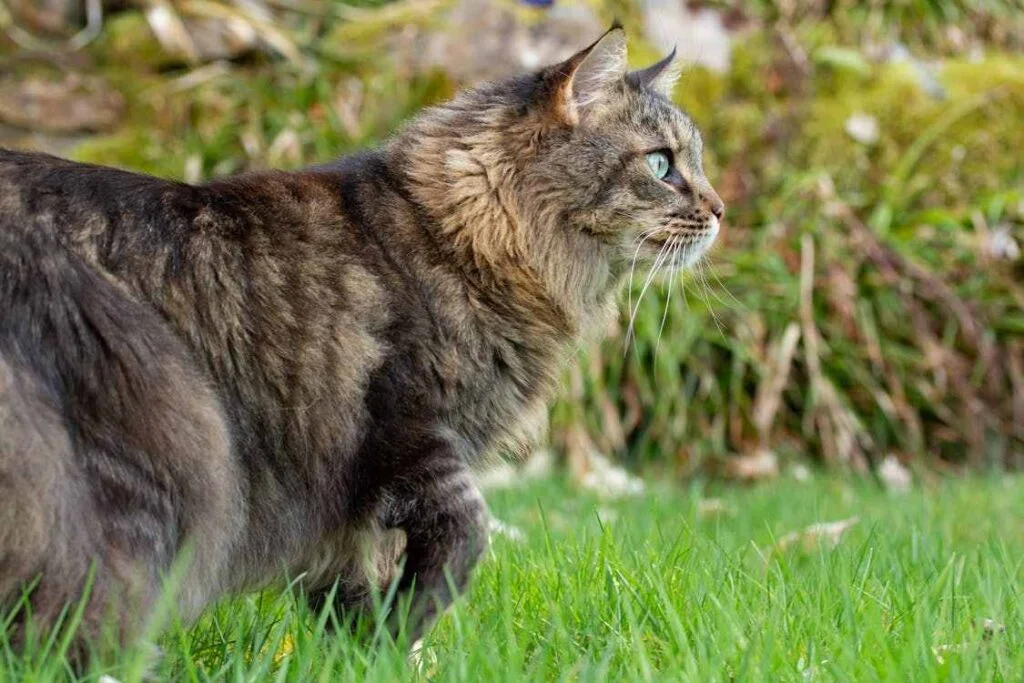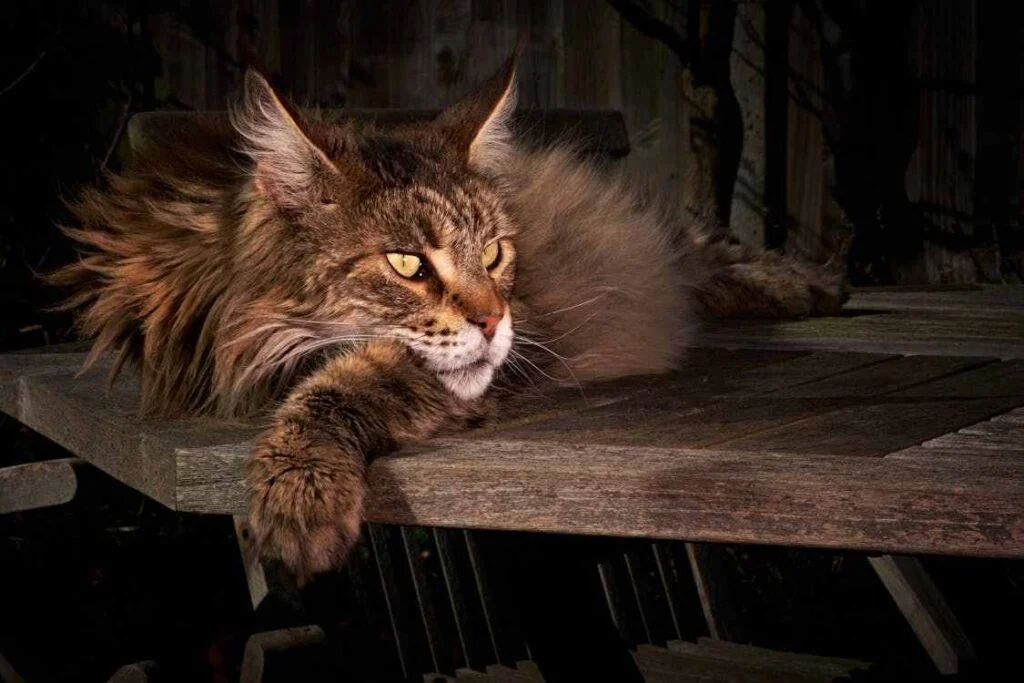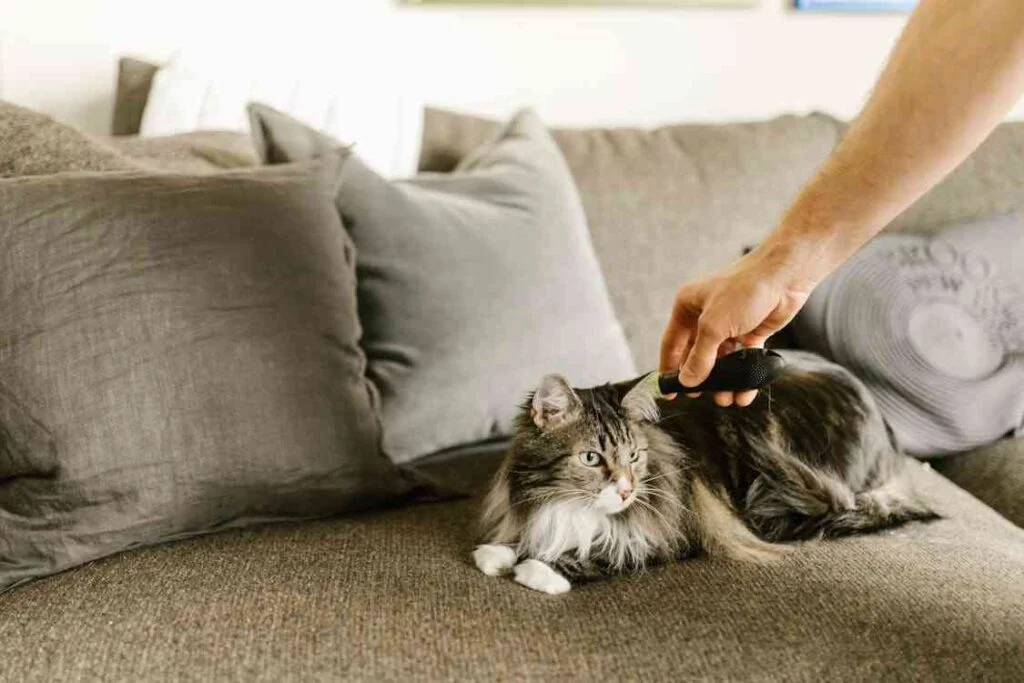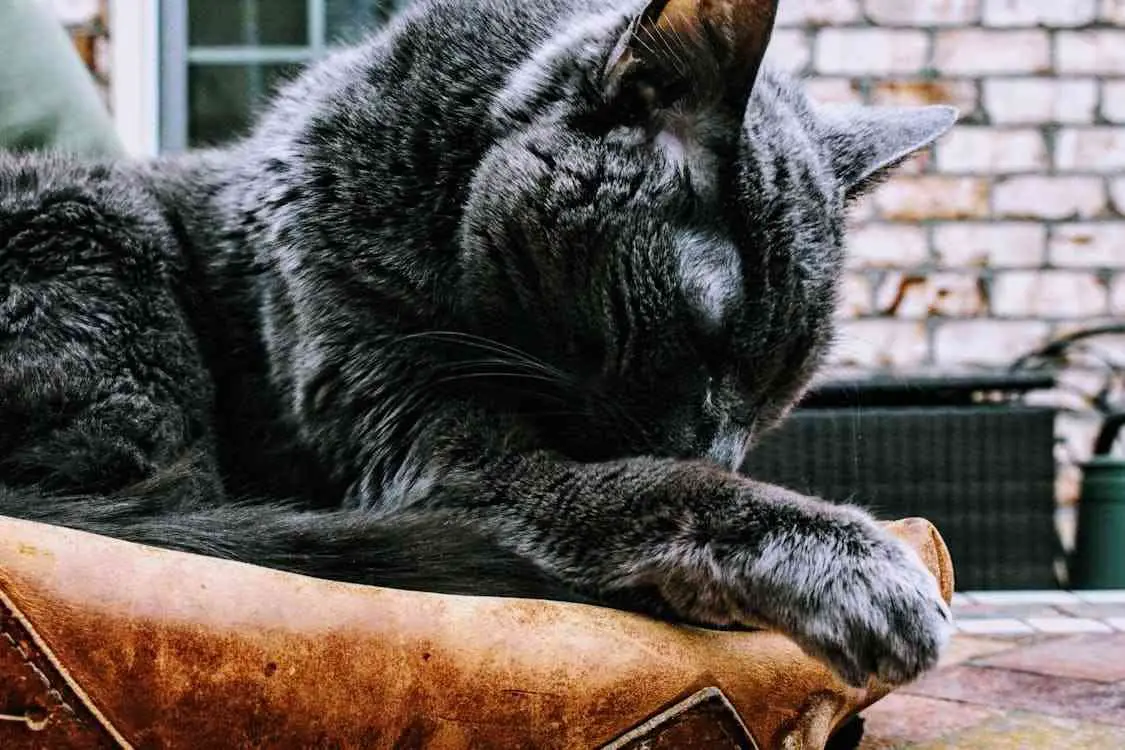Maine Coons are one of the largest domestic cat breeds. They are loved for their sweet nature and looks. Their long, bushy tails and luxurious coats are especially admired. However, as a responsible pet owner, it is important to be aware that thinning tails and hair loss can occur in these wonderful cats. Understanding the underlying causes is important to maintain their health and well-being.
In this article, we cover eight common causes of hair loss in Maine Coon cats, their symptoms, treatment,
8 Common Causes of Hair Loss in Maine Coon Cats
When it comes to Maine Coon cats, their luscious tails are truly a sight to behold. However, if you’ve noticed your cat’s tail thinning, it’s essential to identify the underlying causes to address the issue effectively. In this section, we will explore the seven most common reasons behind Maine Coon tail thinning, shedding light on the factors that could be affecting your cat’s beautiful tail.
1. Genetic Factors
Maine Coons have unique traits that make them stand out. But, genetics can sometimes cause coat problems. This includes a thin coat in some areas. Some Maine Coons are prone to certain coat conditions that can cause the fur to thin, especially around the tail or neck.
Signs to Look For
- Naturally Sparse Fur: Some Maine Coons might have thinner fur on the tail compared to other cats.
- Consistent Pattern: Thinning that follows a consistent pattern without worsening over time.
- Early Onset: Genetic coat issues often appear in the first few years of a cat’s life.
- No Signs of Discomfort: Genetic thinning does not usually cause itching, redness, or discomfort.

2. Nutritional Deficiencies
Diet is key to a cat’s coat health. Malnutrition often causes poor coat quality and thinning fur in Maine Coons. These cats need a balanced diet. It must be high in protein, essential fatty acids, vitamins, and minerals. A lack of protein, biotin, omega-3 and omega-6 fatty acids, and other nutrients can cause a weak coat and hair loss.
Signs to Look For
- Dull and Brittle Fur: A lack of shine and softness is often an early sign of poor nutrition.
- Excessive Shedding: Cats with nutritional deficiencies may shed more than usual.
- Patchy Fur Loss: Areas of the coat, especially around the tail and neck, may appear patchy.
- Dry, Flaky Skin: Deficient nutrients may result in dry or flaky skin, sometimes accompanied by dandruff.
- Weight Changes: Unexplained weight loss or poor muscle tone due to insufficient protein intake.
3. Allergies and Sensitivities
Like humans, Maine Coons can have allergies. They can be allergic to certain foods, dust mites, pollen, mold, or grooming products. Allergies can cause discomfort and itching in certain areas, including the tail, which can cause hair loss and swelling.
Signs to Look For
- Frequent Scratching or Biting: Cats often scratch or bite areas affected by allergies, leading to fur loss.
- Red, Irritated Skin: Redness and inflammation are common symptoms of allergic reactions.
- Hair Pulling: Over-grooming or hair-pulling behavior, especially on the tail.
- Ear and Eye Irritation: Excessive eye-watering, ear infections or discharge can indicate allergies.
- Respiratory Issues: Occasional sneezing or difficulty breathing if environmental allergens are the cause.
4. Skin Conditions
Skin issues like dermatitis, ringworm, and infections can cause intense itching and hair loss. They are very uncomfortable. Maine Coons, with their thick coats, are susceptible to skin problems, which can be difficult until they are advanced.
Signs to Look For
Hair Loss in Circular Patterns: Fungal infections, like ringworm, often cause circular hair loss patches.
Redness and Swelling: Inflamed areas are common indicators of skin infections.
Open Sores or Scabs: Where the cat has been scratching, sores, scabs, or small lesions may appear.
Foul Odor: Infected areas may have an unpleasant odor.
Persistent Dandruff or Greasy Fur: Skin infections can cause dandruff or an oily coat texture.
5. Parasites
Fleas, mites, and ticks are common external parasites. They cause tail thinning and hair loss. Fleas and mites can cause itching and inflammation. This can lead to excessive grooming and scratching.

Signs to Look For
- Persistent Scratching and Grooming: Especially around the tail, neck, and hindquarters.
- Visible Parasites or Flea Dirt: Fleas or black specks in the fur.
- Skin Irritation: Red, irritated patches where the cat has been biting or scratching.
- Small Red Bumps or Scabs: Flea bites can cause small, itchy bumps.
- Patchy Hair Loss: Specific areas of hair loss due to scratching or over-grooming.
6. Stress and Anxiety
Stress and anxiety can lead to behavioral problems, including excessive grooming and hair loss. Maine Coons are social cats and can experience stress from environmental changes, isolation, or new pets in the home.
Signs to Look For
- Behavioral Changes: Sudden aggression, hiding, or clinginess.
- Over-Grooming and Bald Spots: Especially on the tail, belly, or paws.
- Vocalization Changes: Increased vocalization or different vocal sounds.
- Reduced Appetite or Lethargy: Loss of interest in eating or reduced activity.
7. Hormonal Imbalances
Hormonal issues, such as hyperthyroidism or Cushing’s disease, can contribute to thinning hair and other coat changes. Hormonal imbalances affect a cat’s metabolism and skin health, leading to poor coat quality.
Signs to Look For
- Increased Thirst and Urination: Hormonal issues may cause increased water consumption and urination.
- Weight Changes: Sudden weight gain or loss.
- Thin, Brittle Fur: Hormonal imbalances can cause fragile, sparse fur.
- Behavioral Changes: Increased activity (hyperthyroidism) or lethargy (hypothyroidism).

8. Age-Related Changes
As Maine Coons age, their coat may naturally thin, and hair growth may slow. Senior cats may also groom less effectively, leading to coat changes.
Signs to Look For
- Gradual Thinning: Overall thinning of the coat, especially on the tail.
- Dry and Brittle Fur: Increased fur brittleness due to age.
- Decreased Grooming: Cats may stop grooming as much, leading to matting.
FAQs
Q: How can I tell if my Maine Coon cat is experiencing hair loss?
A: You may notice bald patches, itchiness, scratching, or overgrooming in your Maine Coon cat. These signs can indicate hair loss and potential issues with their tail hair.
Q: Can stress cause hair loss in Maine Coon cats?
A: Yes, stress can lead to hair loss in cats, including Maine Coons. It is essential to address any potential sources of stress in your cat’s environment to prevent hair thinning and other health issues.
Q: Are Maine Coon cats more prone to tail hair loss than other cat breeds?
A: While Maine Coon cats are not necessarily more prone to tail hair loss, their long and fluffy tails may make any issues more noticeable. Regular grooming and veterinary check-ups can help maintain your Maine Coon’s coat health.
Q: How can I help my Maine Coon cat during shedding season?
A: Providing regular grooming, a balanced diet, and keeping your cat’s environment stress-free can help support your Maine Coon during shedding season. Consult your vet for additional advice on maintaining your cat’s coat health.
Conclusion
It’s vital to know the causes of hair loss in Maine Coon cats. This will help promote their health and well-being. Many factors can cause tail thinning and coat problems. They include genetics, diet, and the environment. Groom your Maine Coon regularly. Feed it a balanced diet. And, get vet checkups. These are vital for a healthy, vibrant coat. If you notice ongoing hair loss or other symptoms, consult your vet.

Hey guys, My name is Simon Smith. I’m from Canada and live near Victoria
I live with my sweet family and have 20+ Ragdolls of different types. I love them as my children. My profession is as a hotel manager.
I love to keep Ragdolls and grow their breeder case. I have 7 years of experience.
I’m an expert in cat care. So, I’m here to provide you with new information about my cats daily. This is my blog website, so I request that you kindly visit our site daily.
If you’re a Ragdolls lover and you have any questions or confusion about cats, text me on the Contact Us page or Gmail.
Thank u
